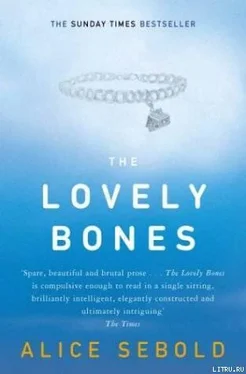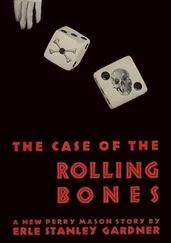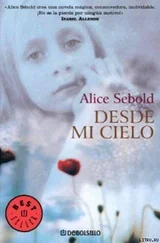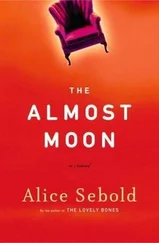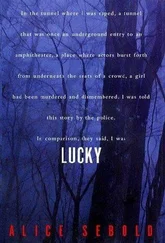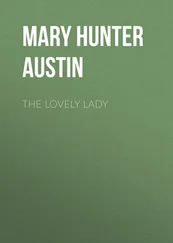
Alice Sebold
The Lovely Bones
Inside the snow globe on my father’s desk, there was a penguin wearing a red-and-white-striped scarf. When I was little my father would pull me into his lap and reach for the snow globe. He would turn it over, letting all the snow collect on the top, then quickly invert it. The two of us watched the snow fall gently around the penguin. The penguin was alone in there, I thought, and I worried for him. When I told my father this, he said, “Don’t worry, Susie; he has a nice life. He’s trapped in a perfect world.”
My name was Salmon, like the fish; first name, Susie. I was fourteen when I was murdered on December 6, 1973. In newspaper photos of missing girls from the seventies, most looked like me: white girls with mousy brown hair. This was before kids of all races and genders started appearing on milk cartons or in the daily mail. It was still back when people believed things like that didn’t happen.
In my junior high yearbook I had a quote from a Spanish poet my sister had turned me on to, Juan Ramón Jiménez. It went like this: “If they give you ruled paper, write the other way.” I chose it both because it expressed my contempt for my structured surroundings à la the classroom and because, not being some dopey quote from a rock group, I thought it marked me as literary. I was a member of the Chess Club and Chem Club and burned everything I tried to make in Mrs. Delminico’s home ec class. My favorite teacher was Mr. Botte, who taught biology and liked to animate the frogs and crawfish we had to dissect by making them dance in their waxed pans.
I wasn’t killed by Mr. Botte, by the way. Don’t think every person you’re going to meet in here is suspect. That’s the problem. You never know. Mr. Botte came to my memorial (as, may I add, did almost the entire junior high school – I was never so popular) and cried quite a bit. He had a sick kid. We all knew this, so when he laughed at his own jokes, which were rusty way before I had him, we laughed too, forcing it sometimes just to make him happy. His daughter died a year and a half after I did. She had leukemia, but I never saw her in my heaven.
My murderer was a man from our neighborhood. My mother liked his border flowers, and my father talked to him once about fertilizer. My murderer believed in old-fashioned things like eggshells and coffee grounds, which he said his own mother had used. My father came home smiling, making jokes about how the man’s garden might be beautiful but it would stink to high heaven once a heat wave hit.
But on December 6, 1973, it was snowing, and I took a shortcut through the cornfield back from the junior high. It was dark out because the days were shorter in winter, and I remember how the broken cornstalks made my walk more difficult. The snow was falling lightly, like a flurry of small hands, and I was breathing through my nose until it was running so much that I had to open my mouth. Six feet from where Mr. Harvey stood, I stuck my tongue out to taste a snowflake.
“Don’t let me startle you,” Mr. Harvey said.
Of course, in a cornfield, in the dark, I was startled. After I was dead I thought about how there had been the light scent of cologne in the air but that I had not been paying attention, or thought it was coming from one of the houses up ahead.
“Mr. Harvey,” I said.
“You’re the older Salmon girl, right?”
“Yes.”
“How are your folks?”
Although the eldest in my family and good at acing a science quiz, I had never felt comfortable with adults.
“Fine,” I said. I was cold, but the natural authority of his age, and the added fact that he was a neighbor and had talked to my father about fertilizer, rooted me to the spot.
“I’ve built something back here,” he said. “Would you like to see?”
“I’m sort of cold, Mr. Harvey,” I said, “and my mom likes me home before dark.”
“It’s after dark, Susie,” he said.
I wish now that I had known this was weird. I had never told him my name. I guess I thought my father had told him one of the embarrassing anecdotes he saw merely as loving testaments to his children. My father was the kind of dad who kept a nude photo of you when you were three in the downstairs bathroom, the one that guests would use. He did this to my little sister, Lindsey, thank God. At least I was spared that indignity. But he liked to tell a story about how, once Lindsey was born, I was so jealous that one day while he was on the phone in the other room, I moved down the couch – he could see me from where he stood – and tried to pee on top of Lindsey in her carrier. This story humiliated me every time he told it, to the pastor of our church, to our neighbor Mrs. Stead, who was a therapist and whose take on it he wanted to hear, and to everyone who ever said “Susie has a lot of spunk!”
“Spunk!” my father would say. “Let me tell you about spunk,” and he would launch immediately into his Susie-peed-on-Lindsey story.
But as it turned out, my father had not mentioned us to Mr. Harvey or told him the Susie-peed-on-Lindsey story.
Mr. Harvey would later say these words to my mother when he ran into her on the street: “I heard about the horrible, horrible tragedy. What was your daughter’s name, again?”
“Susie,” my mother said, bracing up under the weight of it, a weight that she naïvely hoped might lighten someday, not knowing that it would only go on to hurt in new and varied ways for the rest of her life.
Mr. Harvey told her the usual: “I hope they get the bastard. I’m sorry for your loss.”
I was in my heaven by that time, fitting my limbs together, and couldn’t believe his audacity. “The man has no shame,” I said to Franny, my intake counselor. “Exactly,” she said, and made her point as simply as that. There wasn’t a lot of bullshit in my heaven.
Mr. Harvey said it would only take a minute, so I followed him a little farther into the cornfield, where fewer stalks were broken off because no one used it as a shortcut to the junior high. My mom had told my baby brother, Buckley, that the corn in the field was inedible when he asked why no one from the neighborhood ate it. “The corn is for horses, not humans,” she said. “Not dogs?” Buckley asked. “No,” my mother answered. “Not dinosaurs?” Buckley asked. And it went like that.
“I’ve made a little hiding place,” said Mr. Harvey.
He stopped and turned to me.
“I don’t see anything,” I said. I was aware that Mr. Harvey was looking at me strangely. I’d had older men look at me that way since I’d lost my baby fat, but they usually didn’t lose their marbles over me when I was wearing my royal blue parka and yellow elephant bell-bottoms. His glasses were small and round with gold frames, and his eyes looked out over them and at me.
“You should be more observant, Susie,” he said.
I felt like observing my way out of there, but I didn’t. Why didn’t I? Franny said these questions were fruitless: “You didn’t and that’s that. Don’t mull it over. It does no good. You’re dead and you have to accept it.”
“Try again,” Mr. Harvey said, and he squatted down and knocked against the ground.
“What’s that?” I asked.
My ears were freezing. I wouldn’t wear the multicolored cap with the pompom and jingle bells that my mother had made me one Christmas. I had shoved it in the pocket of my parka instead.
I remember that I went over and stomped on the ground near him. It felt harder even than frozen earth, which was pretty hard.
Читать дальше
